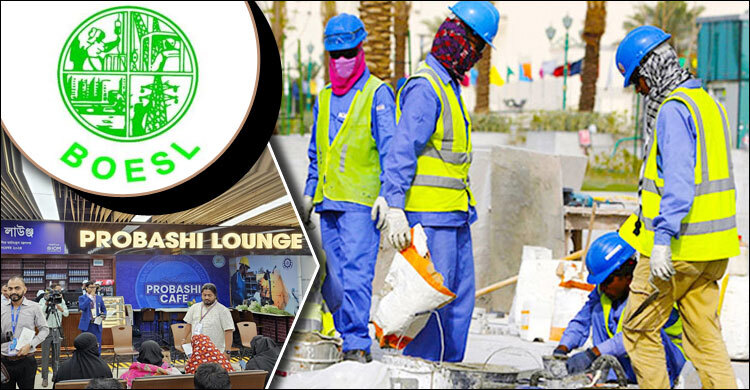BOESL’s workforce market ‘stuck’ in Jordan

Bangladesh Overseas Employment and Services Limited (BOESL), the country's only state-run recruiting agency, was established in 1984 under the Ministry of Expatriates' Welfare and Overseas Employment to facilitate manpower export. Despite this mandate, BOESL has struggled to open new labour markets over the past decade, with the majority of workers being sent to Jordan.
BOESL currently operates in 32 countries, including South Korea, Malaysia, Kuwait, Mauritius, and Fiji, with recent additions like Romania, Bulgaria, and Brunei. However, the organisation lags behind private recruiting agencies in expanding labour markets, focusing heavily on Jordan and South Korea, while contributing minimally to labour exports in the Middle East and Europe.
In the fiscal year 2023-24, BOESL facilitated overseas employment for 15,558 Bangladeshi workers, with 11,502 sent to Jordan and 3,019 to South Korea. In 2022-23, BOESL sent 15,294 workers, primarily to Jordan and South Korea. Other destination countries, such as Fiji, Lebanon, and Romania, received only a small fraction of these workers.
BOESL’s export performance over the years
Compared to private agencies, BOESL’s contributions are modest. From 2010 to 2024, BOESL sent just 1,43,215 workers abroad, with 1,06,253 going to Jordan and 31,037 to South Korea. Meanwhile, over 7.7 million Bangladeshis have migrated for work in the past decade, with 1.35 million alone in the fiscal year 2022-23. This stark disparity raises questions about BOESL’s effectiveness in fulfilling its original mandate to broaden labour markets and promote fair competition in manpower export.
Perspectives from migration experts
Shariful Hasan, Head of Migration at BRAC, noted that BOESL’s limited reach restricts its impact on the labour market. “Sending 10,000 to 12,000 people a year is minimal,” he said. “There’s no fraud in BOESL’s process, and workers receive fair salaries. However, the agency needs to scale up its operations and aim to send at least 100,000 workers annually.”
Hasan added that improved coordination between BOESL and the Bureau of Manpower Employment and Training (BMET) or Technical Training Centres (TTCs) could enhance the supply of skilled workers, which would ultimately boost government-led labour exports.
Migration expert Asif Munier highlighted the need for policy changes to enable BOESL to open new labour markets. “BOESL could focus on sending fewer but skilled workers to new markets with lower costs for the migrants,” he suggested, emphasising the importance of embassy coordination to understand foreign employers' requirements.
BOESL’s position and challenges
BOESL’s Executive Director, Md Shawkat Ali, pointed to the competition with over 2,200 private recruiting agencies, which often have more resources to expand into new markets. “If we enter a market, these agencies become our competitors. Despite sending around 15,000 workers yearly, we face challenges in scaling up due to limited resources,” he explained.
Regarding the dominance of Jordan in BOESL’s labour market, Ali noted that under the G2G (government-to-government) policy, only BOESL can send workers to Jordan.
“This demand is driven by Jordan’s preference for Bangladeshi workers, particularly women, due to Bangladesh’s strong garment sector.”
Ali acknowledged that BOESL has struggled to gain a foothold in Saudi Arabia, where private agencies have established strong relationships with employers, offering benefits that BOESL cannot match.
He expressed hopes to increase annual deployments to at least 30,000, but noted the agency faces manpower shortages and challenges in sourcing skilled candidates.
Ali also highlighted a lack of skilled workers as a recurring issue. “Many of those applying through BOESL do not meet basic educational requirements, which limits our ability to send workers to destinations requiring specific skills, such as South Korea and Japan,” he said.
Future outlook and expansion efforts
BOESL is actively working to open labour markets in Europe. “Last year, we submitted a memorandum of understanding to Italy and the European Union. Although these processes take time, we are hopeful,” Ali said, adding that BOESL’s labour welfare wings in 27 countries are in ongoing communication with potential employers.

